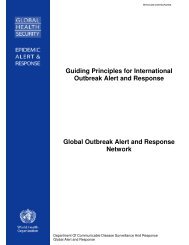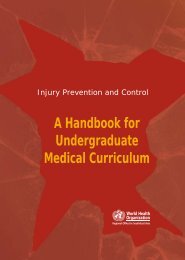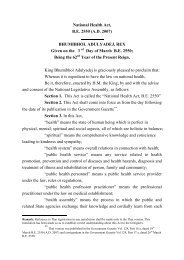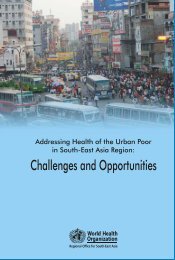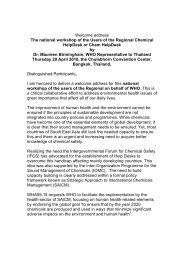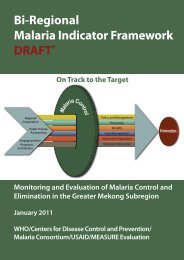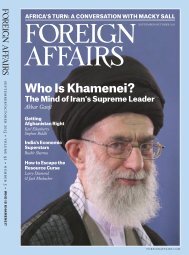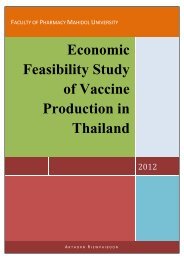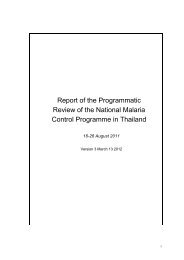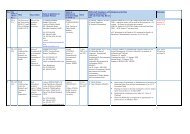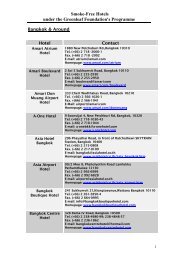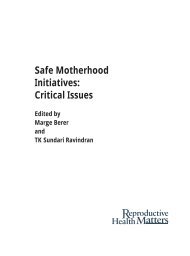Water for people.pdf - WHO Thailand Digital Repository
Water for people.pdf - WHO Thailand Digital Repository
Water for people.pdf - WHO Thailand Digital Repository
You also want an ePaper? Increase the reach of your titles
YUMPU automatically turns print PDFs into web optimized ePapers that Google loves.
R E C O G N I Z I N G A N D V A L U I N G T H E M A N Y F A C E S O F W A T E R / 3 4 3ReferencesThe Abuja Ministerial Declaration on <strong>Water</strong> – a Key to Sustainable Development inAfrica. 2002. African Ministerial Conference on <strong>Water</strong> (AMCOW), 29–30 April 2002,in Abuja.ADB (Asian Development Bank). 2001. <strong>Water</strong> <strong>for</strong> All: The <strong>Water</strong> Policy of the AsianDevelopment Bank. Manila.———. 1997. Second <strong>Water</strong> Utilities Data Book. Manila.AFDB (African Development Bank). 2000. Policy <strong>for</strong> Integrated <strong>Water</strong> ResourcesManagement. OCOD (Organization <strong>for</strong> Cooperation in Overseas Development).Albiac, J. 2002. ‘<strong>Water</strong> Demand Management versus <strong>Water</strong> Supply Policy: the Ebro River<strong>Water</strong> Transfer’. Paper presented at the <strong>Water</strong> Forum 2002, World Bank, 6–8 May2002, Washington.Barlow, M. 1999. Blue Gold: The Global <strong>Water</strong> Crisis and the Commodification of theWorld’s <strong>Water</strong> Supply. Council of Canadians, IFG Committee on the Globalization of<strong>Water</strong>.———. 2000. ‘<strong>Water</strong> Is a Basic Human Right – or Is It?’. Toronto Globe and Mail, Toronto(also quoted in NEXUS New Times Magazine, August-September 2000, Vol. 7, No. 5).Boyle, K.-J. and Bergstrom, J.-C. 1994. A Framework <strong>for</strong> Measuring the EconomicBenefits of Ground <strong>Water</strong>. Department of Agricultural and Resource EconomicsStaff Paper. Orono, University of Maine.Briscoe, J. 1999. ‘The Financing of Hydropower, Irrigation and <strong>Water</strong> SupplyInfrastructure in Developing Countries’. International Journal of <strong>Water</strong> ResourcesDevelopment, Vol. 15, No. 4, pp. 459–91.———. 1998. ‘The Changing Face of <strong>Water</strong> Infrastructure Financing in DevelopingCountries’. International Journal of <strong>Water</strong> Resources Development, Vol. 15, No. 3,pp. 301-8.———. 1997. ‘Managing water as an economic good’. In: M. Kay; T. Franks; L. Smith(eds.), <strong>Water</strong>: Economics, Management and Demand. London, E and FN Spon.Bryce S. 2001. ‘Hydrodollars: <strong>Water</strong> Privatisation’. NEXUS New Times Magazine, Vol. 8,No. 3.Buckley, R. 1999. 1998 Annual Review of Development Effectiveness. Washington, DC,World Bank, Operations Evaluation Department.Burke, J. and Moench, M. 2000. Groundwater and Society: Resources, Tensions andOpportunities. New York, UNDESA (United Nations Department of Economic andSocial Affairs), E.99.II.A.1.Burke, J.; Sauveplane, C.; Moench, M. 1999. Groundwater Management andSocioeconomic Responses. Natural Resources Forum, Vol. 23, pp. 303–13.Calder, I.-R. 1998. ‘<strong>Water</strong> use by <strong>for</strong>ests, limits and controls’. Tree Physiology, Vol. 18,pp. 625–31.Cosgrove, W. and Rijsberman, F.-R. 2000. World <strong>Water</strong> Vision: Making <strong>Water</strong> Everybody’sBusiness. London, UK, World <strong>Water</strong> Council and Earthscan Publications Ltd.Costanza, R.; d’Arge, R.; de Groot, R.; Farber, S.; Grasso, M.; Hannon, B.; Limburg, K.;Naeem, S.; O’Neill, R.; Paruelo, J.; Raskin, R.; Sutton, P., van den Belt, M. 1997.‘The value of the world’s ecosystem services and natural capital’. Nature, Vol. 387,pp. 253–60.Dinar, A. (ed.). 2000. The Political Economy of <strong>Water</strong> Pricing Re<strong>for</strong>ms. New York, WorldBank and Ox<strong>for</strong>d University Press.Dublin Statement. 1992. Official outcome of the International Conference on <strong>Water</strong> andthe Environment: Development Issues <strong>for</strong> the 21st century, 26–31 January 1992,Dublin. Geneva, World Meteorological Organization.EEC (European Economic Community). 2000. Framework Directive in the Field of <strong>Water</strong>Policy (<strong>Water</strong> Framework). Directive 2000/60/EC of the European Parliament and ofthe Council of 23 October 2000, establishing a framework <strong>for</strong> Community action inthe field of water policy [Official Journal L 327, 22.12.2001].Ehrlich, P.-R., Ehrlich A.-H., Daily, G. 1995. The Stork and the Plow: The Equity Answerto the Human Dilemma. New York, G.P. Putnam’s Sons.FAO (Food and Agriculture Organization). 2001. The State of Food and Agriculture.Rome.———. 1999. Irrigation and Drainage Paper # 58. Rome.Federal Ministry <strong>for</strong> the Environment, Nature Conservation and Nuclear Safety, andFederal Ministry <strong>for</strong> Economic Co-operation and Development. 2001. MinisterialDeclaration, Bonn Keys, and Bonn Recommendations <strong>for</strong> Action. InternationalFreshwater Conference, 3–7 December 2001, Bonn.Gibbons, D.-C. 1986. The Economic Value of <strong>Water</strong>. Washington DC, Resources <strong>for</strong> theFuture.Gleick, P.-H. 2001. ‘Making Every Drop Count’. Scientific American, February, pp. 28–33.———. 1998. The World’s <strong>Water</strong> 1998–1999: The Biennial Report on FreshwaterResources. Washington DC, Island Press.Goodland R. 1995. ‘Environmental Sustainability Needs Renewable Energy: The Extentto Which Big Hydro is Part of the Transition’. Paper presented to the InternationalCrane Foundation Workshop, 28 November – 2 December, 1995, Washington, DC.Gutierrez, E. 1999. ‘Boiling Point: Issues and Problems in <strong>Water</strong> Security and Sanitation’.A <strong>Water</strong>Aid Briefing Paper. London.GWP (Global <strong>Water</strong> Partnership). 2000. Toward <strong>Water</strong> Security: A Framework <strong>for</strong> Actionto Achieve the Vision <strong>for</strong> <strong>Water</strong> in the 21st Century. Stockholm.ICON/RWSSFDB (Rural <strong>Water</strong> Supply and Sanitation Fund Development Board). 2002.Detailed Demand Assessment Study. Nepal.Irrigation Newsletter. 2001. No. 54. ‘Kathmandu, Irrigation Development andManagement in Nepal’. Department of Irrigation, Irrigation Management Division.IUCN (The World Conservation Union). 2002. Johannesburg Programme of Action. Adocument prepared <strong>for</strong> the World Summit on Sustainable Development (WSSD),28 August-4 September, Johannesburg.Ministerial Declaration of The Hague on <strong>Water</strong> Security in the 21st Century. 2000.Official outcome of the Second World <strong>Water</strong> Forum, 3–7 December 2001, TheHague.Narayan, R. 2002. ‘Sustainability: <strong>Water</strong> and the Choices We Face’. Earth Times, August.NRC (National Research Council). 1997. Valuing Ground <strong>Water</strong>: Economic Concepts andApproaches. Washington, Committee on Valuing Ground <strong>Water</strong>, WSTB (<strong>Water</strong>Science and Technology Board), Commission on Geosciences, Environment, andResources (CGER), NRC (National Research Council). Washington DC, NationalAcademy Press.NEPAD (New Partnership <strong>for</strong> Africa’s Development). 2001. The New Partnership <strong>for</strong>Africa’s Development.OECD (Organization <strong>for</strong> Economic Cooperation and Development). 1999a. Household<strong>Water</strong> Pricing in OECD Countries. ENV/EPOC/GEEI(98)12/FINAL. Paris, WorkingParty on Economic and Environmental Policy Integration, Environment Directorate,Environment Policy Committee.———. 1999b. Agricultural <strong>Water</strong> Pricing in OECD Countries.ENV/EPOC/GEEI(98)11/FNAL77608. Paris, Working Party on Economic andEnvironmental Policy Integration, Environment Directorate, Environment PolicyCommittee.———. 1992. The Polluter-Pays Principle, OECD Analyses and Recommendations.OECD/GD(92)8. Paris, Organization <strong>for</strong> Economic Cooperation and Development.Ostojic, Ž.; Lukšic, M. 2001. <strong>Water</strong> Pricing in Croatia, Current Policies and Trends.Zagreb, Regional Environmental Center <strong>for</strong> Central and Eastern Europe.Pitman, G.-K. 2002. Bridging Troubled <strong>Water</strong>s: Assessing the <strong>Water</strong> Resources StrategySince 1993. Washington, Operation Evaluation Division, World Bank.



